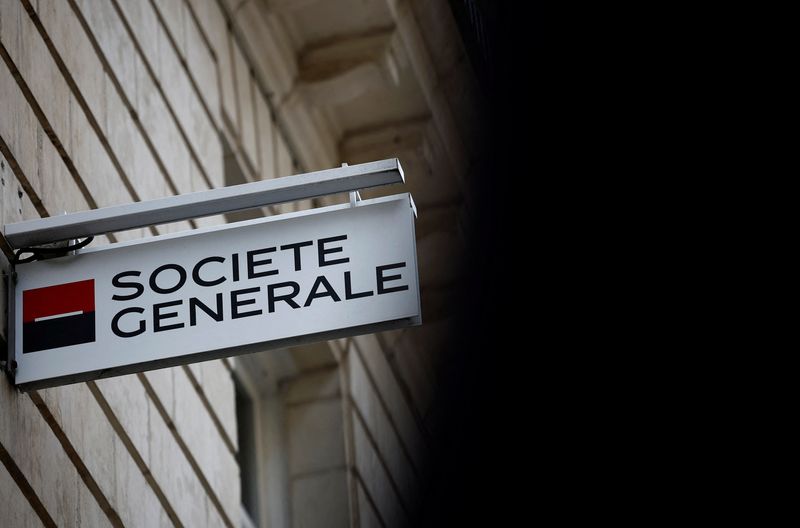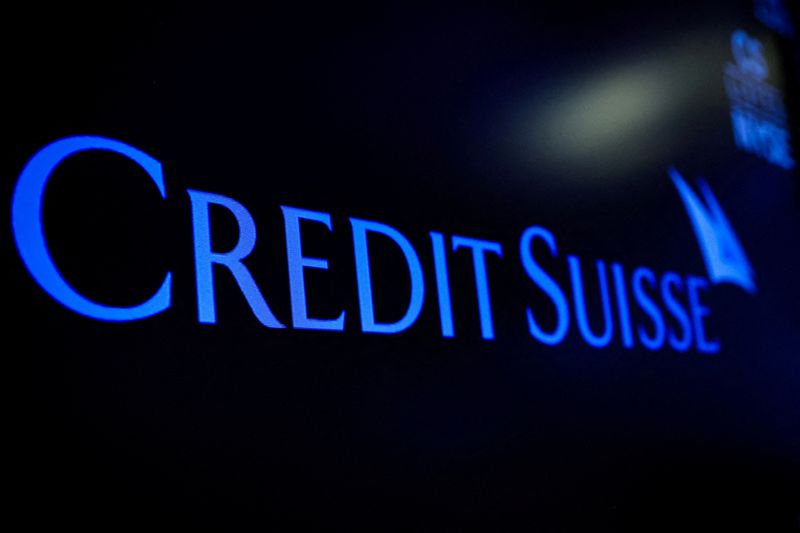By Shankar Ramakrishnan, Stefania Spezzati and Sumeet Chatterjee
(Reuters) -At least four major banks, including Societe Generale (OTC:SCGLY) SA and Deutsche Bank AG (NYSE:DB), are restricting new trades involving Credit Suisse Group AG or its securities, according to five sources with direct knowledge of the matter, as the Swiss bank struggles to restore confidence.
Credit Suisse declined to comment.
The cautious stance adopted by Credit Suisse’s rivals, details of which have not been reported before, comes after the Swiss central bank threw a lifeline to the lender after its shares were pummelled in the aftermath of the U.S. banking crisis this week.
Credit Suisse intends to borrow up to 50 billion Swiss francs ($54 billion) from the Swiss National Bank in what it called "decisive action" to boost its liquidity on Thursday.
The curbs add to the bank’s problems as it tries to restructure operations and find its footing after a series of costly scandals. Credit Suisse's chief financial officer Dixit Joshi and his teams will hold meetings over the weekend to assess strategic scenarios for the bank, other people with knowledge of the matter told Reuters on Friday.
The five people with direct knowledge of the bank's trading counterparties requested anonymity because of the sensitivity of the situation.
Societe Generale has maintained existing counterparty positions with Credit Suisse, which it had cut back in recent weeks, but it is not increasing them, according to two sources with direct knowledge of the situation.
Societe Generale declined to comment.
Deutsche Bank (ETR:DBKGn), meanwhile, this week slashed the lending value it assigns to Credit Suisse securities, such as bonds, put up by its wealth management clients as collateral for loans, according to a top executive at a European wealth manager that has business ties with the German lender. Earlier, the bank would value them at about 70% to 80% of face value, the source said.
Deutsche Bank declined to comment.
HSBC Holdings Plc (LON:HSBA)'s private banking business has also started scrutinizing its loans linked to Credit Suisse securities, which are in the hands of clients in Europe and Asia, a source with direct knowledge of the matter said. The source added that the bank has not taken any decision yet on lowering its exposure to the Swiss lender but was watching developments closely and will take a decision early next week.
HSBC declined to comment.
Another source at a major global bank, who deals directly with Credit Suisse in Asia, said their bank had started asking the Swiss lender to gross settle, a trading scenario where the counterparty demands up-front payment instead of collecting any money that might be due as a result of a trade later.
Another global bank has reduced its unsecured exposure to Credit Suisse, which includes all lending with no collateral, according to a person with knowledge of the matter. The bank is still providing repurchase agreements, which is secured lending.
In Asia, a mid-sized Chinese brokerage which was previously trading bonds and entering derivatives contracts with Credit Suisse, on Friday stopped assuming counterparty risk with the Swiss lender, according to a person with knowledge of the matter.
Credit Suisse has said that it is a strong, global bank. "We fulfill and basically overshoot all regulatory requirements. Our capital, our liquidity basis is very strong,” Chief Executive Ulrich Koerner said earlier this week in a media interview.
The lender told Reuters on Thursday that its average liquidity coverage ratio, a measure of how much cash-like assets the bank has, was 150% as of March 14, the same measure as on March 8 before the U.S. had to step in to guarantee deposits at two US banks triggering a sell-off in lenders' stocks and bonds.

Still, with investor confidence remaining weak, some analysts have said the loan from the central bank has only bought Credit Suisse time to work out what to do next strategically to restore profitability.
Among possible scenarios, analysts, bankers and investors speculate that Credit Suisse could sell or wind down some of its existing businesses with a break-up potentially on the cards.
